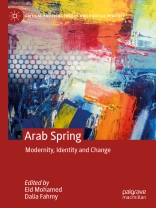This book provides systematic, integrated analyses of emergent social and cultural dynamics in the wake of the so-called Arab Spring, and looks closely at the narratives and experiences of a people as they confront crisis during a critical moment of transition. Providing an interdisciplinary approach to interconnections across regional and communal boundaries, this volume situates itself at the intersection of political science, cultural studies, media and film studies, and Middle Eastern studies, while offering some key critical revisions to dominant approaches in social and political theory. Through the unique contributions of each of its authors, this book will offer a much-needed addition to the study of Middle East politics and the Arab Spring. Moreover, although its specific focus is on the Arab context, its analysis will be of issues of significant relevance to a changing world order.
Tabella dei contenuti
1. Arab Spring: Modernity, Identity and Change. 2. Whither Post-Islamism: Revisiting the Discourse/Movement After the Arab Spring.- 3. Islamists and Politics Today in Tunisia: The Foundation of a Democratic Islamic Party Possible?.- 4. The ‘Arab Spring’ and the End of Turkish Democracy.- 5. Re-examining Hasan al-Banna’s Model of Da‘wah in the Post Arab Spring Era.- 6. Democracy Promotion 2.0: Barack Obama and the ‘Arab Spring’ Conundrum.- 7. The Struggle for Revolutionary Memory: Historiography and documentation of the January 25 Revolution.- 8. Affective Encounters: Women, Hope, and Activism in Egypt.- 9. On Samir Murqus, the Narrative of Crisis and the Triumph of Tahrir.- 10. Seeking New Metaphors: Gender Identities in Tunisia and Lebanon.- 11. Constructing Civic Space: Civil Resistance, Sustainable Citizen Empowerment, and Transitional Justice as Pathways of Change in Contemporary Arab Politics.- 12. Unity – Consensus – Reconciliation: The Substance of Tunisia’s Elite Compromise’ An Analysis of Post-revolutionary Metaphors.- 13. Conclusion.
Circa l’autore
Eid Mohamed is Assistant Professor of Comparative Literature and US-Arab Cultural Politics at Doha Institute for Graduate Studies and the University of Guelph, Canada.
Dalia Fahmy
is Associate Professor of Political Science at Long Island University, USA.












